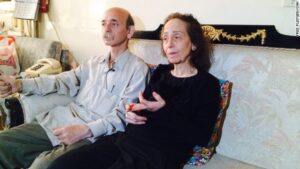
1. Militarily and in an immediate sense also politically the success of the government cannot be denied. But it is to be noted that it became possible because of a negotiated withdrawal and not a full-fledged capitulation. This shows how difficult it is for the government to advance militarily and that this does not mean a pacification of the situation.
2. The democratic left insisted that the better solution would have been a ceasefire and pacification leaving the militants in place this opening up spaces for dissent. In this way they would have been turned into a civil political opposition as they had started out three years back. Unfortunately first of all the government continues to be unwilling for such a step and secondly also the rebels seem not ready for that, neither the unaffiliated ones let alone the Jihadis.
3. Looking closer into the event the narrative of the government becomes questionable. There appeared the story of several Christian families who survived years of siege. Pictures showed siblings by the name of Ayman and Zeinat Akhras starving but alive. It is difficult to imagine that they could have survived without being tolerated by at least some of the rebels. True, the Dutch Jesuit Frans van der Lugt, who chose not to leave the old city either, was killed by some of them days before the agreement to effect. But it appears not plausible that all or most of the rebels have been head-cutting Takfiris having flocked in from across the world. Actually no name of an armed group was ever mentioned to be party to the deal. Michel Naaman, a Syriac Catholic priest from the city and one of the negotiators, denied that among the remaining rebels had been any foreigners. On a state TV network he even said that most of them were locals. Apparently the Jihadi groups had already evacuated by themselves triggering a bitter feud and prompting accusations of betrayal. An interview with a former fighter from Homs in Al-Monitor supports the assumption that many of the militants have been former activists haven taken up arms.
4. The defeat inflicted on the insurgency in Homs should be an occasion for all those still true to the aims of the original democratic popular movement to reconsider armed struggle and even more the drive to a regular war. While it is understandable to resort to arms when the government leaves no room for peaceful democratic protests and only responds by disproportionate violence, it might nevertheless politically not be appropriate under given specific circumstances. There has been a dialectical relation of militarization, sectarianism and foreign intervention transforming the democratic popular mass movement into a sectarian civil war with proxy characteristics. Though the democratic movement had not the immediate means to reform let alone topple the regime, it indeed had a strong appeal also into the popular constituencies of the regime itself and could aspire for gathering the large majority even across sectarian identities. Militarization led to the political re-stabilisation of the government instead. Jihadism was the colour in which it painted the movement and eventually succeeded in creating his preferred enemy.
5. It is not excluded that the government troops can further advance and regain territory as Jihadism looses popular support. Nevertheless there is a strategic miscalculation of the ruling group. Not because of the obvious foreign support both sides enjoy which is far from being exhausted. But faltering popular support to the rebels does not mean to lend support to the government side. A certain form of civil war can continue for years fostering a dictatorship much worse than the one in Egypt restored by Sissi and his military. The deep rifts also of sectarian nature created by the protected civil war will put a spell on society worse than the one in Iraq. Regardless whether the splits will remain on a de-facto level or will be formalised as well, it will increase the dependency on imperialism – the exact contrary of what Assad claims to stand for. The only way out remains a political settlement with significant sections of the Islamic forces, something the ruling groups continues to rule out. (See International Initiative for a Political Solution)
6. On the other hand the Syrian civil war demonstrates the incapacity of Sunni Political Islam to offer a viable alternative to imperialist rule as they claim to do. They are unable to build sufficient consensus, cannot cope with cultural diversity and do not tackle the problem of a social-economic development project adverse to the global capitalist system. In Egypt this led to a situation where the old military elites could regain enough support to stage a coup, return to power and end the Arab spring. That does, however, not mean that Political Islam will fade away soon. It will remain a powerful popular current and main opposition as long as the third pole of democratic and social revolutionary forces does not offer a significant alternative. Latter will only be able to gain ground on two conditions: Firstly clearly defining the local capitalist elites and their embedment into the global imperialist system as main enemy. Secondly not falling into the secularist trap thus being able to approach and develop the anti-elite and anti-imperialist momentum within the popular masses enclosed in the Islamic identity but mixed up with other aspects tying them to the ruling system.